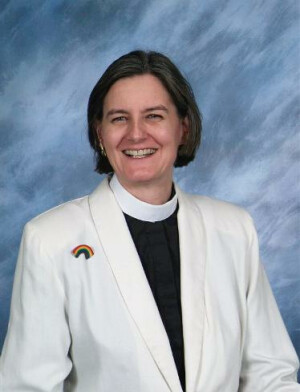Diocese of Montana Newsletter, June 2020

Society's Sins
I am bereft, not just for my own grief, nor just for those who have died or been crippled by this pandemic, but for seeing a man beg for his life and then slowly die at the hand of one who had pledged to serve and protect. This has happened over and over in my lifetime. People are afraid of people who look different from them, but our minority populations, our people of color, suffer the greater consequence. I have no eloquent words; others such as the Bishop Michael Curry, the Rev Dr. Otis Moss III, the Rev. Jim Bear Jacobs and the Rev Martin Luther King are better at this.
 When I was a new priest, one of my parishioners was a black second grader in the school next to our church. He was accused at school by a vice principal of looking up a white girl’s dress while at play at her house on the weekend. The vice principal threatened him not only with expulsion from the school, but also with jail because that is where “black boys wound up”. He was 7 years old. Seven. Years. Old. While his fellow white parishioners in the county’s educational system addressed the issue of the vice principal’s words (he was fired), I was tasked by his grandmother to give him “the talk”. “The talk” is that for a black child to be safe in a white world they must make themselves smaller, quieter, especially if they are male. I hope that I was able to nuance it. I think I did; he graduated as an award-winning student journalist and is a news reporter and newscaster for a major outlet in NYC. What would have happened if his fellow parishioners had not stepped in? Where would he be now? Even today as a young adult back man, I worry for his safety and pray for him regularly.
When I was a new priest, one of my parishioners was a black second grader in the school next to our church. He was accused at school by a vice principal of looking up a white girl’s dress while at play at her house on the weekend. The vice principal threatened him not only with expulsion from the school, but also with jail because that is where “black boys wound up”. He was 7 years old. Seven. Years. Old. While his fellow white parishioners in the county’s educational system addressed the issue of the vice principal’s words (he was fired), I was tasked by his grandmother to give him “the talk”. “The talk” is that for a black child to be safe in a white world they must make themselves smaller, quieter, especially if they are male. I hope that I was able to nuance it. I think I did; he graduated as an award-winning student journalist and is a news reporter and newscaster for a major outlet in NYC. What would have happened if his fellow parishioners had not stepped in? Where would he be now? Even today as a young adult back man, I worry for his safety and pray for him regularly.
We cannot place the blame on people of color for their over-representation in economic poverty, in becoming incarcerated, or in dying either violently or from treatable diseases. In the twenty-first century, we cannot blame all of this on the small percentage of whites who are overtly racist. The responsibility resides with the prejudice that is ground into the very core of our society and into which each of us is enculturated, no matter what our skin color. It literally colors our perceptions. For the most part, we are not conscious of it. But for me, as a white woman, I can choose to ignore its impact by thinking that it does not affect me. But the English poet John Donne, an Anglican priest, pointed out that fallacy a long time ago. (Click below to continue reading.)
 When I was a new priest, one of my parishioners was a black second grader in the school next to our church. He was accused at school by a vice principal of looking up a white girl’s dress while at play at her house on the weekend. The vice principal threatened him not only with expulsion from the school, but also with jail because that is where “black boys wound up”. He was 7 years old. Seven. Years. Old. While his fellow white parishioners in the county’s educational system addressed the issue of the vice principal’s words (he was fired), I was tasked by his grandmother to give him “the talk”. “The talk” is that for a black child to be safe in a white world they must make themselves smaller, quieter, especially if they are male. I hope that I was able to nuance it. I think I did; he graduated as an award-winning student journalist and is a news reporter and newscaster for a major outlet in NYC. What would have happened if his fellow parishioners had not stepped in? Where would he be now? Even today as a young adult back man, I worry for his safety and pray for him regularly.
When I was a new priest, one of my parishioners was a black second grader in the school next to our church. He was accused at school by a vice principal of looking up a white girl’s dress while at play at her house on the weekend. The vice principal threatened him not only with expulsion from the school, but also with jail because that is where “black boys wound up”. He was 7 years old. Seven. Years. Old. While his fellow white parishioners in the county’s educational system addressed the issue of the vice principal’s words (he was fired), I was tasked by his grandmother to give him “the talk”. “The talk” is that for a black child to be safe in a white world they must make themselves smaller, quieter, especially if they are male. I hope that I was able to nuance it. I think I did; he graduated as an award-winning student journalist and is a news reporter and newscaster for a major outlet in NYC. What would have happened if his fellow parishioners had not stepped in? Where would he be now? Even today as a young adult back man, I worry for his safety and pray for him regularly.We cannot place the blame on people of color for their over-representation in economic poverty, in becoming incarcerated, or in dying either violently or from treatable diseases. In the twenty-first century, we cannot blame all of this on the small percentage of whites who are overtly racist. The responsibility resides with the prejudice that is ground into the very core of our society and into which each of us is enculturated, no matter what our skin color. It literally colors our perceptions. For the most part, we are not conscious of it. But for me, as a white woman, I can choose to ignore its impact by thinking that it does not affect me. But the English poet John Donne, an Anglican priest, pointed out that fallacy a long time ago. (Click below to continue reading.)
Click here to read the complete newsletter, including the following:
- Society's Sins
- Resources
- Around the Diocese
- Camp Marshall: summer online programs
- Update on Camp Marshall's Dock
- Invite, Welcome, Connect! An Episcopal Evangelism Tool - Free Zoom Webinar, June 10
- St. Patrick's, Bigfork - the walls are going up!
- Love God, Love Neighbor: Episcopal Month of Action - a series of webinars
- Standing up to Anti-Semitism, by Rev. Valerie Webster
- Anti-Racism: Listening to and Becoming Allies to our Black and Brown Neighbors
- Places of Worship in Missoula find brigh spots in remote services - Missoulian article
- The Rev. Deacon Steve DeHart granted a sabbatical leave
- Congratulations to The Venerable Dorcie Dvarishkis!
- Finance Corner, by Barb Hagen
- All Saints' - Columbia Falls: Building project
- 2020 Diocesan Convention
- St. James, Bozeman, hiring a part-time Youth Director
- Clergy Conference rescheduled: Sept. 1-3, Camp Marshall
- Episcopal Relief & Development: 1000 Days of Love
- Episcopal Service Corps: recruitment for 2020-21 service year
- Ecumenical
